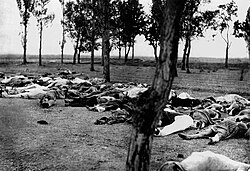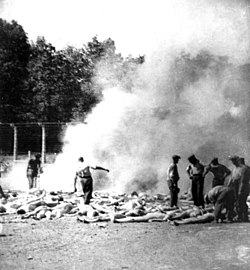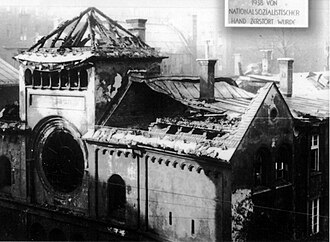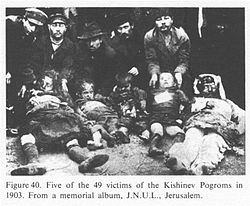Genocide
 From Rationalwiki
From Rationalwiki
| RationalWiki's Chilling Tales of True Crime |
| Articles on illegal behaviour |
| Busted |
“”The duty of the survivor is to bear testimony to what happened… You have to warn people that these things can happen, that evil can be unleashed. Race hatred, violence, idolatries — they still flourish.
|
| —Elie Wiesel |
“”Every genocide in history has had a justification, at least in the eyes of those who committed it: of self-defense in the face of existential danger, of a war of no choice, of victims who had 'brought it upon themselves'.
|
| —Yuli Novak, director of the Israeli human rights organization B’Tselem[2] |
A genocide is the attempted destruction of a group of people, most often a nation or culture. These attempts can range from merely destroying all of the things that make an ethnic group (forced language policies, destruction of history), to forced sterilization of the group (to prevent further generations from being born), to attempts at whole-scale extermination (as was done in the Holocaust). The word was coined in 1943 by Raphael Lemkin, a Jewish-Polish-British scholar, to describe Ottoman eliminationist policies towards Armenians, which was soon thereafter applied to the Nazi policies of extermination and cultural suppression.
Whether action constitutes genocide depends on the breadth of the definition. Some forms of mass murder, as with undeniably preventable famines such as the Great Bengal Famine of 1943 or the Great Chinese Famine (1958-62) might not be deemed genocide, but take as many lives as the events recognized as genocide. From a legal point of view, mass killings that don't fit the definition of genocide are generally still crimes against humanity. Meanwhile, things like forced assimilation are not considered genocide by the UN definition, but many people, including Lemkin, believe that cultural genocide is still genocide.
Without coercion of some sort, there is no genocide. Therefore, completely peaceful assimilation of one group into another cannot be considered genocide,[note 1] nor can intermarriage between groups, despite what some people say. In the wake of the Rwandan genocide, however, large-scale rape, when carried out to destroy or break up a group as described below, is beginning to become seen as an act of genocide as well.[3] This would considerably (and, arguably, justifiably) expand the definition and range of the crime of genocide — in Burma's Karen provinces, for example, Burmese soldiers are ordered to rape Karen![]() women;[4] since Karen culture is patrilineal, this then leads to a drastic reduction in Karen births,[5] to say nothing of the spread of STDs, and intense psychological and physical trauma to the victims.
women;[4] since Karen culture is patrilineal, this then leads to a drastic reduction in Karen births,[5] to say nothing of the spread of STDs, and intense psychological and physical trauma to the victims.
Official definition[edit]
The internationally recognised, legal definition of genocide is found in Article II of the United Nations Convention on the Prevention and Punishment of Genocide:[6][7]
“”In the present Convention, genocide means any of the following acts committed with intent to destroy, in whole or in part, a national, ethnic, racial, or religious group, as such:
|
Article III of the Convention delineates the following acts as punishable:
“”(a) Genocide;
(b) Conspiracy to commit genocide; |
The issue of what constitutes a part of an ethnic group, however, is a contested legal problem — would it be an act of genocide if I killed a single member of group 'X', if she was the only X on my street and I wanted to make my street a 'Y'-only neighbourhood? Cases of this sort would technically fall under the remit of the above law, but are not usually treated as genocide. Hundreds of thousands of deaths are not necessary to reach a verdict of genocide, either, with the International Criminal Tribunal for the former Yugoslavia,[8] and the International Court of Justice[9] agreeing that it had taken place in the Srebrenica massacre, in which only 8,000 were killed. Furthermore, the massacre of 900 Ache Indians between 1968 and 1972 in Paraguay under the authoritarian regime of Alfredo Stroessner is considered a case of genocide.[10] Another problem with the definition is the fact that in order to be considered genocide, an act must be committed in an attempt to destroy a group — merely targeting members of a certain group isn't enough.[11] There's also the problem of cultural genocide, which is the attempted destruction of a culture through methods such as forced assimilation and suppression of cultural identifiers like languages or traditional clothing. Lemkin (who, need we remind you, coined the term "genocide") considered these acts of genocide, even using as examples Nazi Germany banning the French language in Luxembourg schools and the Nazis' destruction of Polish art.[12] Despite this, it is excluded from the UN's definition, largely because the Allied Powers, which were heavily involved in imperialism and had a lot to answer for in terms of cultural genocide, were the ones writing the documents.[13]
The mass killings by the Khmer Rouge are illustrative of some of the limitations of the definition of genocide. According to a ruling by an international tribunal, it counts as a genocide only because ethnic minorities were also targeted.[14] Obviously, many people are unsatisfied with this, as it suggests that the ethnic Cambodians who died were not victims of a genocide, even though many groups besides ethnic groups were targeted.[11]
Democide![]() is a more encompassing concept of genocide that is not bounded by legal definitions.[15][16] Democide includes both intentional and unintentional government-caused killings.[15]
is a more encompassing concept of genocide that is not bounded by legal definitions.[15][16] Democide includes both intentional and unintentional government-caused killings.[15]
Eight Stages of Genocide[edit]
Gregory Stanton published a paper entitled The Eight Stages of Genocide and presented it to the US State Department, the UN, and various other political bodies around the world. He outlined ways we identify true "genocide". While it is important for addressing questions like "Was the conquering of Native Americans a 'genocide' or was it simply the result of dominance in military actions", the Eight Stages of Genocide also have a far more practical and important point. That is, identifying future genocides and preventing them before they happen again:[17]
- Classification — People separate themselves into "us/them" groups. This may initially be done on even terms and accepted by both parties, as with the African tribal associations in Rwanda. This is a universal attribute of all societies and does not necessarily result in genocide. All societies have categories to distinguish between groups of people with different common denominators (skin color, ethnicity, race, religion, nationality). Countries which are considered "bipolar" in that there are negligible mixed categories (such as Burundi and Rwanda) are considered the most likely to have genocides.
- Symbolization — Like classification, this is universally human, as all societies apply symbols to members of a group. Symbolization becomes dangerous and becomes a stage in genocide when it is infused with hatred or feelings of superiority by another group; for example, one or both groups may begin to use hate speech and/or develop symbols (usually derogatory) to represent the "other," which can lead to the next stage…
- Dehumanization — A society goes from simply defining another group as "not us" to being "vermin", "insects", "plagues", "parasites", "subhuman", or "animals". This works in genocide by overcoming empathy towards a group, making it possible to violate or kill members of the group without remorse.
- Organization — Stanton suggests that a true genocide is always organized as such, with people in power invoking violence on others, pushing the rhetoric with words like "destroy", "remove", "cleanse", or purify". In many modern cases from, Rwanda to China, military units were trained specifically to systematically destroy a culture and therefore the people.
- Polarization — Polarizing hate speech steps up; rhetoric becomes common and normal, and it is usually associated with the violence of terms like "cleanse". Moderates are assassinated to silence the center and render it passive. Moderates slow down the cycle and are usually the first to go. As a result of polarizing hate speech and repression of moderates, the false dilemma of "us and them" is ingrained in the public consciousness. Laws may be enacted forbidding intermarriage or social interaction between the two groups.
- Preparation — (perhaps better understood as separation or isolation) The group in power begins to ward off, isolate, or even capture the "other". At this point, victim groups are fully aware that it is not simply about rights or freedom, but their very life as a community or people. Examples of preparation include the "ghettoization" of Jews in Nazi-occupied Europe.
- Extermination — (Stanton uses this term deliberately because in his research the criminal party sees the victim population as bugs, viruses, etc., to be exterminated. They are not humans to be killed or murdered.)
- Denial — The final stage is denial, where the perpetrators attempt to deny, suppress details of, or even attempt to rationalize and/or justify the genocide (stifling investigations, destroying evidence, and victim blaming are common tactics).
Denialism[edit]

“”Deliberate denial of a known genocide is a harmful act that deserves to be includes in the same moral domain as actual contributions to a genocide — indirect and direct. Indeed, denial may be appropriately regarded as the last stage of genocide, one that can continue long after the actual killing has ended.
|
| —Eric Markusen & Israel W. Charny[18]:159 |
Genocide denial is particularly common both for the Armenian Genocide (Armenian Genocide denial) and the Holocaust (Holocaust denial), as well as the Native American genocides. In the case of Holocaust denial, Deborah Lipstadt concluded from an exhaustive survey that most deniers were antisemites or bigots, but that there were also many other motives for denial.[19]
Israel Charny and Daphna Fromer listed five characteristics of arguments ("logic") used by genocide deniers:[20]
- "Innocence and self-righteousness": claiming that people could not have been so evil
- "Science in the service of confusion": science doesn't know everything
- "Practicality, pragmatism, and realpolitik": There will never be world peace, so one must be practical.
- "Distorted linkages and temporal confusions": dishonestly pulling ideas out of context, i.e., justifying one action with a decontextualized action from a different time, a type of non sequitur
- "Indirection, definitionalism, reversal": methods of avoiding the essential issue of whether genocide occurred
Gregory Stanton has categorized 12 ways in which people attempt to deny genocide:[21]
- Question and minimize the statistics
- Attack the motivations of the truth-tellers
- Claim that the deaths were inadvertent
- Emphasize the strangeness of the victims
- Rationalize the deaths as the result of tribal conflict
- Blame "out of control" forces for committing the killings
- Avoid antagonizing the genocidists, who might walk out of "the peace process"
- Justify denial in favor of current economic interests
- Claim that the victims are receiving good treatment
- Claim that what is going on doesn't fit the definition of genocide
- Blame the victims
- Say that peace and reconciliation are more important than blaming people for genocide
Genocides since 1900[edit]
Published in 2010, The Oxford Handbook of Genocides provides the following list of events since 1900 that are commonly accepted as genocides:[22]:600
| When | Where | Who was being genocided? | Perpetrator |
|---|---|---|---|
| 1904–5 | German South West Africa | Herero people | German Empire |
| 1915–18 | Ottoman Empire | Armenians | Ottoman Empire |
| 1935–9 | Italian Ethiopia | Ethiopians | Fascist Italy |
| 1937–9 | USSR | The kulaks | Stalin and his crew |
| 1937–45 | East Asia | Everyone | Japanese Empire |
| 1941–5 | Nazi-occupied Europe | Especially (but not only) Jews | Nazi Germany |
| 1965–6 | Indonesia | Suspected communists | Indonesian government |
| 1967–70 | Nigeria | Biafran civilians | Nigerian government |
| 1971 | Bangladesh | Bengali Hindus | Pakistan Armed Forces |
| 1972 | Burundi | Hutus | Burundi's government |
| 1975–9 | Cambodia | Everyone | Khmer Rouge |
| 1981–3 | Guatemala | "Communists" and Mayan people | Guatemalan government |
| 1992 | Sudan | Nuba people | Sudanese government |
| 1992–5 | Bosnia and Herzegovina | Bosnian Muslim | Bosnian Serb Army |
| 1994 | Rwanda | Tutsi and Hutu moderates | Hutu militia supported by the Rwandan government |
| 2003–Publication of the book | Sudan—Darfur | Various African groups | Government backed militias |
Since the book was published, events that have been widely described as genocides include the Uyghur genocide, the Yazidi genocide, the Rohingya genocide,![]() and the Gaza genocide.
and the Gaza genocide.![]() The Russian actions during the Russia-Ukraine War have also been labeled as genocidal.[23]
The Russian actions during the Russia-Ukraine War have also been labeled as genocidal.[23]
Not Genocides[edit]
Racists often promote the conspiracy theory that there is a genocide against white people. Usually this comes in the form of claims that the increase in immigration from Third World nations is some sort of Zionist/Illuminati/Freemason/Socialist/Liberal plot to cause the demographic destruction of the white race. Aside from being absolutely absurd, this wouldn't qualify as genocide, as there is no plan to kill white people. It is also not unusual for white nationalists to claim that there is an ongoing genocide of white people in South Africa, initiated by Nelson Mandela (or more recently the current president, Cyril Ramaphosa[24]). Ironically, while Israel was one of the last states to cut ties with Apartheid South Africa, white nationalists will often claim that Jews are the ones behind this “evil liberal conspiracy”.
While it is well-established that the Armenian Genocide and the Holodomor took place, white nationalists will often try to blame the Jews for both of these genocides.[25]
In the Anglosphere, white supremacists like to claim that affirmative action, interracial relationships, and pretty much everything else are attempts to create genocide of the so-called "white race," despite ignoring current rates in demographics. Members of Black supremacy movements as well as certain individuals in the anti-choice crowd occasionally make the claim that abortion is a method of back-door genocide against minorities. (They also ignore current rates in demographics.)
In India, Hindu nationalists believe that Hindus are being genocided by a coalition of Christians, Muslims, communists, and Westerners as part of their persecution complex, as Hindus are the majority religious group in India. The claims are used to promote Hindu nationalist views, erode India's secular constitution, and justify hate crimes against the Muslim minority.
Nazi sympathizers may claim that there was a genocide of Germans taking place in Poland in the late 1930s, citing forged evidence from the Nazi Party as evidence for this supposed genocide. This, they argue, was a justification for the German invasion of Poland, and therefore the allies were the aggressors. It is yet to be established what the Netherlands, Belgium, Luxembourg, Denmark, or Norway did that warranted a German invasion if the Nazis were truly acting in "self-defence". Similarly, in the lead-up to Russia's invasion of Ukraine, Russian propaganda outlets were claiming that there was a genocide of Russians taking place in the Donbas region, but there is no evidence that this has happened.[26] Some tankies also buy into Russian's false claims of a Donbas genocide, simply because Putin is seemingly anti-Western and occasionally praises the USSR, in spite of his own far-right Russian nationalist policies.
Religion and genocide[edit]
Genocide can often be couched in religious terms. The centuries of pogroms preceding the Holocaust, for example, were religiously motivated by the idea that the Jews were collectively guilty of killing Jesus. Many also attempted to justify the U.S.'s American Indian policy in the 19th and 20th centuries by citing the tribes' refusal to convert to Christianity. This belief is still held by some professed fundamentalists, e.g., Bryan Fischer of the American Family Association.[27]
Certain parts of the Old Testament of the Bible are often cited as a model for this sort of genocide. The best-known example is in the Book of Joshua, where the Israelites, finally coming into possession of their "land of milk and honey," at God's command conquer thirty-one kingdoms, killing all the kings, men, women, and children.
Another example, used by the Puritans of New England to justify battles against American Indians, is found in 1 Samuel 15:1: God tells King Saul to annihilate an enemy population, the Amalekites, but Saul does not carry out this command perfectly — he spares their king and a few of their tastier morsels of livestock. God proceeds to get very angry at him for this insubordination. The story of the Amalekites is featured in Bible study courses put on by the Good News Clubs, as an illustrative example to American schoolchildren of the necessity of obeying God in all particulars.[28] [29]
See also[edit]
- Crimes against humanity
- Race war, for conspiracy theories about hypothetical genocide
- Genocide conspiracy, ibid
- War crimes
External links[edit]
Notes[edit]
References[edit]
- ↑ Will Hatred Ever End? by Elie Wiesel (June 1, 1995) The Watchtower.
- ↑ Rights groups are first in Israel to accuse government of genocide. The two groups said they found deliberate intent by Israeli decision-makers to target the whole population of Gaza and destroy life for the Palestinian people. by Gerry Shih & Abbie Cheeseman (July 29, 2025) The Washington Post (archived from 29 Jul 2025 13:06:04 UTC).
- ↑ Rome Statute of the International Criminal Court Text of the Rome Statute circulated as document A/CONF.183/9 of 17 July 1998 and corrected by process-verbaux of 10 November 1998, 12 July 1999, 30 November 1999, 8 May 2000, 17 January 2001 and 16 January 2002. The Statute entered into force on 1 July 2002.
- ↑ Dying Alive by Guy Horton (2005) Images Asia.
- ↑ Burma: Insurgency and the Politics of Ethnicity by Martin Smith (1999) Zed Books, 2nd ed. ISBN 9781856496605.
- ↑ Convention on the Prevention and Punishment of the Crime of Genocide Approved and proposed for signature and ratification or accession by General Assembly resolution 260 A (III) of 9 December 1948 Entry into force: 12 January 1951, in accordance with article XIII
- ↑ Genocide United Nations Office on Genocide Prevention and the Responsibility to Protect (archived from December 28, 2018).
- ↑ Facts about Srebrenica — Summary of the International Criminal Tribunal for the former Yugoslavia judgement on the case
- ↑ Summary of the ICJ conclusions on the case
- ↑ Richard Arens, Genocide in Paraguay (1976) Temple University Press. ISBN 0877220883.
- ↑ 11.0 11.1 Emerging Voices: Controversy on the Definition of the Cambodian Genocide at the ECCC, Mélanie Vianney-Liaud, OpinioJuris 20 August 2014
- ↑ Chapter IX: "Genocide" (Section II) from Raphael Lemkin's Axis Rule in Occupied Europe: Analysis, Proposals for Redress, Prevent Genocide International
- ↑ The Return of Cultural Genocide?, Leora Bilsky and Rachel Klagsbrun, European Journal of International Law May 2018
- ↑ Khmer Rouge’s Slaughter in Cambodia Is Ruled a Genocide, Hannah Beech, The New York Times 15 November 2018
- ↑ 15.0 15.1 Democide versus Genocide: Which is What? by R. J. Rummel (May 1998).
- ↑ Death by Government: Genocide and Mass Murder Since 1900 by R. J. Rummel (1997) Routledge. ISBN Routledge.
- ↑ The 8 Stages of Genocide by Gregory Stanton (1998) Genocide Watch.
- ↑ "Denials of Genocide, Psychology of" by Eric Markusen & Israel W. Charny. In: Encyclopedia of Genocide (1999), edited by Israel W. Charny. ABC-CLIO, pp. 159-161. ISBN 0874369282.
- ↑ Denying the Holocaust: The Growing Assault on Truth and Memory by Deborah Lipstadt (1994) Plume. ISBN 0452272742. p. 206.
- ↑ Five Characteristics of the "Logic of Denials of Genocide" by Israel W. Charny & Daphna Fromer. In: Encyclopedia of Genocide (1999), edited by Israel W. Charny. ABC-CLIO, p. 160.
- ↑ The 12 Ways to Deny a Genocide by Gregory H. Stanton (13 September 2004, updated 15 June 2005) '"Genocide Watch.
- ↑ Bloxham, Donald; Moses, A. Dirk (2010). The Oxford handbook of genocide studies. Oxford: Oxford University Press. ISBN 978-0-19-923211-6.
- ↑ See the Wikipedia article on Allegations of genocide of Ukrainians in the Russo-Ukrainian War.
- ↑ The truth about white farmers in South Africa — and why the right is obsessed with them by Joe Sommerlad (23 August 2018 12:45) The Independent.
- ↑ We Watched Gavin McInnes’s Full Anti-Semitic Rant So You Don’t Have To: The Rebel personality has a lot of thoughts about Jews — and they're even worse in context. by Jonathan Goldsbie (March 14, 2017) Canadaland.
- ↑ Fact check: Russia falsely blames Ukraine for starting war, DW News 3 March 2022
- ↑ Fischer: Native Americans Are Mired In Poverty and Alcoholism Because They Refuse to Accept Christianity by Kyle Mantyla (February 8, 2011 1:16 pm) Right Wing Watch.
- ↑ How Christian fundamentalists plan to teach genocide to schoolchildren: Good News Clubs' evangelism in schools is already subverting church-state separation. Now they justify murdering nonbelievers by Katherine Stewart (30 May 2012 10.15 EDT; First published on Wed 30 May 2012 10.15 EDT) The Guardian.
- ↑ Kill them all, children by Ophelia Benson (June 4, 2012) Free Thought Blogs.
Categories: [Authoritarianism] [Crimes against humanity] [Genocide] [Government incompetence] [History] [Human rights] [Law] [Racism] [War] [Totalitarianism]
↧ Download as ZWI file | Last modified: 09/05/2025 00:54:16 | 176 views
☰ Source: https://rationalwiki.org/wiki/Genocide | License: CC BY-SA 3.0
.jpg)



 KSF
KSF